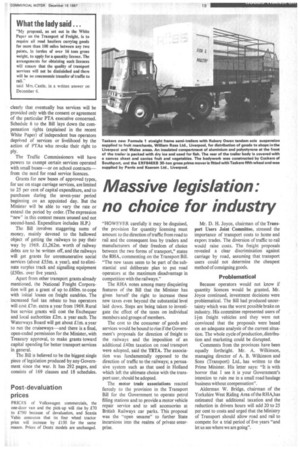Massive legislation: no choice for industry
Page 21

If you've noticed an error in this article please click here to report it so we can fix it.
"HOWEVER carefully it may be disguised, the provision for quantity licensing must amount to the direction of traffic from road to rail and the consequent loss by traders and manufacturers of their freedom of choice between the two forms of transport," states the RHA, commenting on the Transport Bill. "The new taxes seem to be part of the substantial and deliberate plan to put road operators at the maximum disadvantage in competition with the railways."
The RHA notes among many disquieting features of the Bill that the Minister has given herself the right to increase these new taxes even beyond the substantial level laid down. Steps are being taken to investigate the effect of the taxes on individual members and groups of members.
The cost to the consumer of goods and services would be bound to rise if the Government's proposals for direction of freight to the railways and the imposition of an additional £40m taxation on road transport were adopted, said the TRTA. The association was fundamentally opposed to the direction of traffic to the railways; a persuasive system such as that used in Holland which left the ultimate choice with the transport user, should be adopted.
The motor trade associations reacted fiercely to the provision in the Transport Bill for the Government to operate petrol filling stations and to provide a motor vehicle repair service and to sell accessories at British Railways car parks. This proposal was the "open sesame" to further State incursions into the realms of private enterprise.
Mr. D. H. Joyce, chairman of the Transport Users Joint Committee, stressed the importance of transport costs to home and export trades. The diversion of traffic to rail would raise costs. The freight proposals revealed a clear discrimination against carriage by road, assuming that transport users could not determine the cheapest method of consigning goods.
Problematical Because operators would not know if quantity licences would be granted, Mr. Joyce continued, investment decisions were problematical. The Bill had produced uncertainty which was the worst possible brake on industry. His committee represented users of freight vehicles and they were not convinced that the proposals were based on an adequate analysis of the current situation. The whole cycle of production, distribution and marketing could be disrupted.
Comments from the provinces have been equally forthright. Mr. A. Wilkinson, managing director of A. B. Wilkinson and Sons (Transport) Ltd., has written to the Prime Minister. His letter says: "It is with horror that I see it is your Government's intention to ruin me in a small road haulage business without compensation".
Alderman W. Bridge, chairman of the Yorkshire West Riding Area of the RHAjhas estimated that additional taxation and the reduction in drivers hours will add 20 to 25 per cent to costs and urged that the Ministry of Transport should allow road and rail to compete for a trial period of five years "and let us see where we are going".












































































































